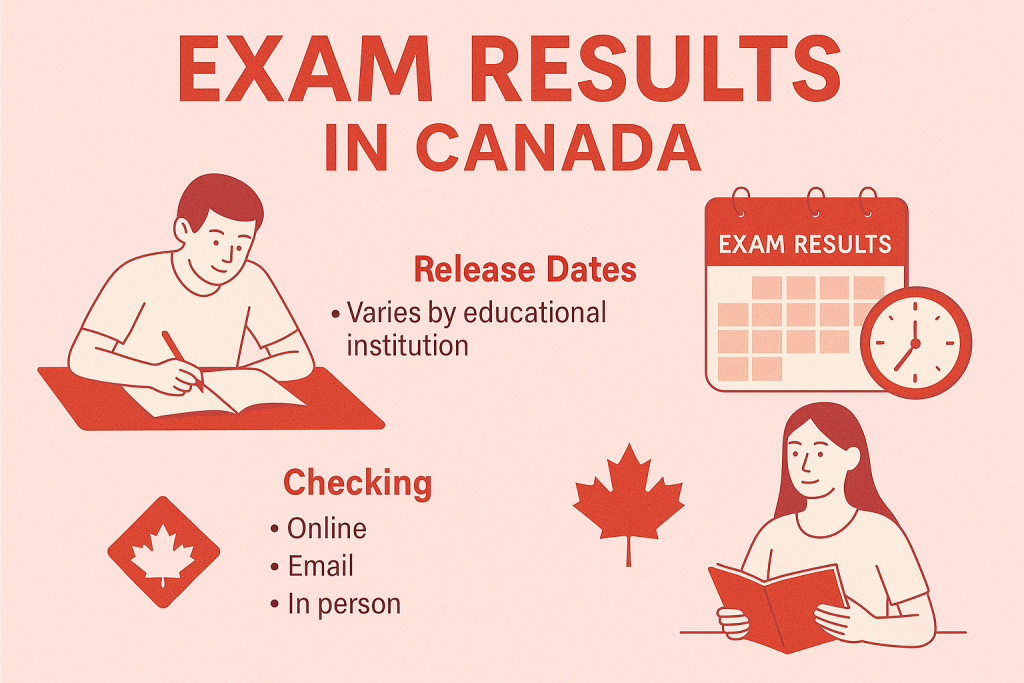Exams in Canada carry weight, but the way results are handled varies from province to province. Ontario has the OSSD, British Columbia and Alberta include provincial exams, Quebec runs its CEGEP system, and universities across Canada rely on the GPA to measure student performance. Add in international exams like IELTS or TOEFL for global opportunities, and it’s clear that results day is a nerve-wracking event for many students. Let’s go through when exam results are announced in Canada, how students check them, how to handle fear, and why the Canadian system is flexible and unique.

🗓️ When Results Are Announced
- High School:
- Ontario (OSSD) → results in late June.
- BC & Alberta provincial exams → results by July.
- Quebec CEGEP → marks and R-Scores in early summer.
- University:
- Fall semester (Sept–Dec) → grades released in Dec/Jan.
- Winter semester (Jan–Apr) → grades released in May.
- Summer semester (May–Aug) → grades released in August.
- International Exams:
- IELTS → 13 days.
- PTE → 2–5 days.
- TOEFL → about 6 days.
- GRE, MCAT, LSAT → 3–5 weeks depending on the board.
🔎 How Students Check Results
- School/University portals: Secure logins for official grades.
- OUAC (Ontario): High school students applying to university use this.
- Emails & Letters: Institutions often notify students directly.
- Printed reports: Still handed out in many high schools.
- Exam websites: IELTS, TOEFL, GRE, etc. provide dedicated portals.
😰 What to Do If Fear or Anxiety Comes
- Put results in perspective: Exams matter, but they don’t lock in your future.
- Stay active: Sports, gym, or outdoor activities reduce stress.
- Talk with family or friends: You’ll see that everyone feels the same.
- Make a Plan B: Canada’s system allows plenty of alternate pathways.
- Avoid comparisons: Everyone has their own academic journey.
💡 Motivation Tips
- Celebrate the effort: Studying hard is an achievement on its own.
- Visualize calmly: Imagine checking your results with confidence.
- Set new short-term goals: Use results as a guide for the next step.
- Stay flexible: Colleges, apprenticeships, and bridging programs give second chances.
📘 Best Books and Resources
- High School: Nelson Education guides, Pearson resources, provincial exam past papers.
- University: Past exam banks, lecture slides, online library resources.
- International Exams:
- IELTS → Cambridge IELTS books.
- TOEFL → Kaplan, Princeton Review.
- GRE/MCAT/LSAT → Manhattan Prep, Kaplan, Princeton Review.
🌏 Why Canada’s Exam System is Unique
- Provincial diversity: Each region has its own structure.
- Pathway flexibility: University, college, apprenticeships – all respected routes.
- Holistic admissions: Grades are only one piece of the puzzle.
- Balanced culture: Sports, arts, and community involvement are encouraged along with academics.
📝 Final Words
Exams in Canada are important, but they don’t define everything. Whether it’s your OSSD, your university GPA, or your IELTS score, keep this in mind:
- Results are milestones, not life sentences.
- Canada’s system ensures multiple paths forward.
- Effort, persistence, and resilience matter more than one score.
So, when results are announced, check them calmly. Whatever the outcome, Canada’s education system ensures you’ll always have another opportunity.